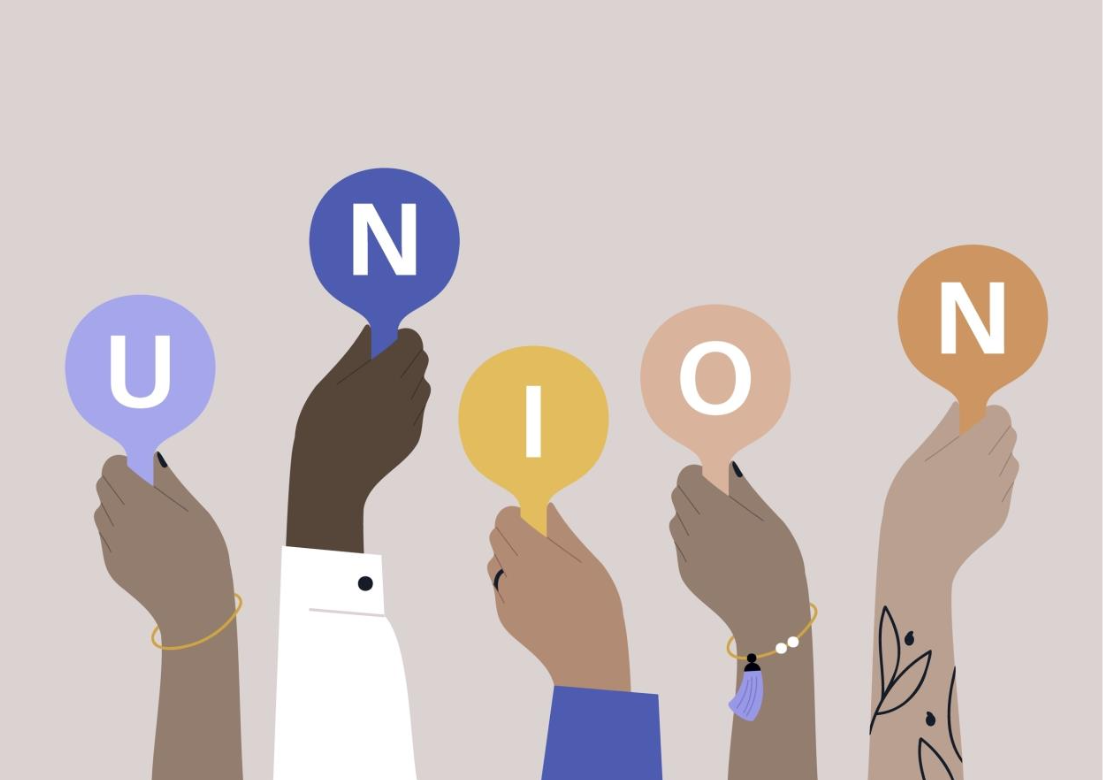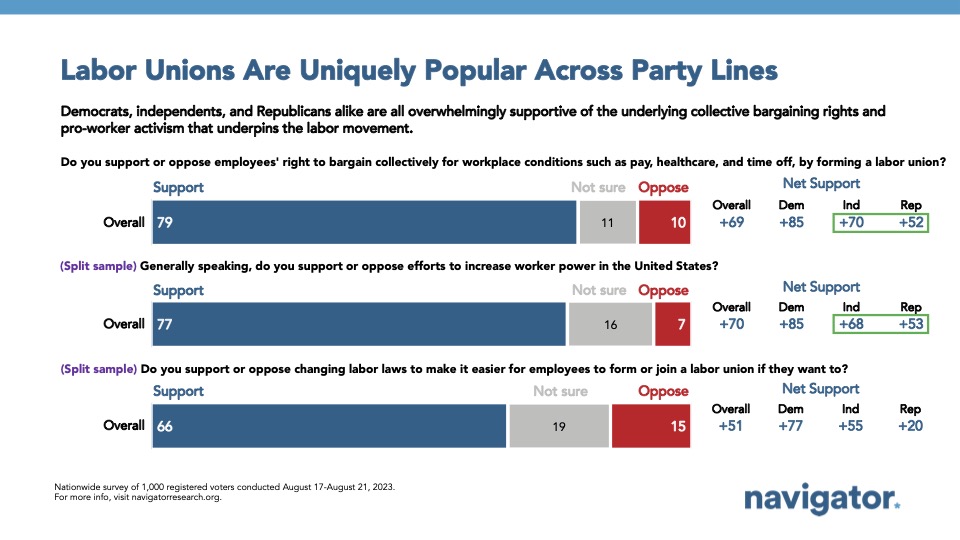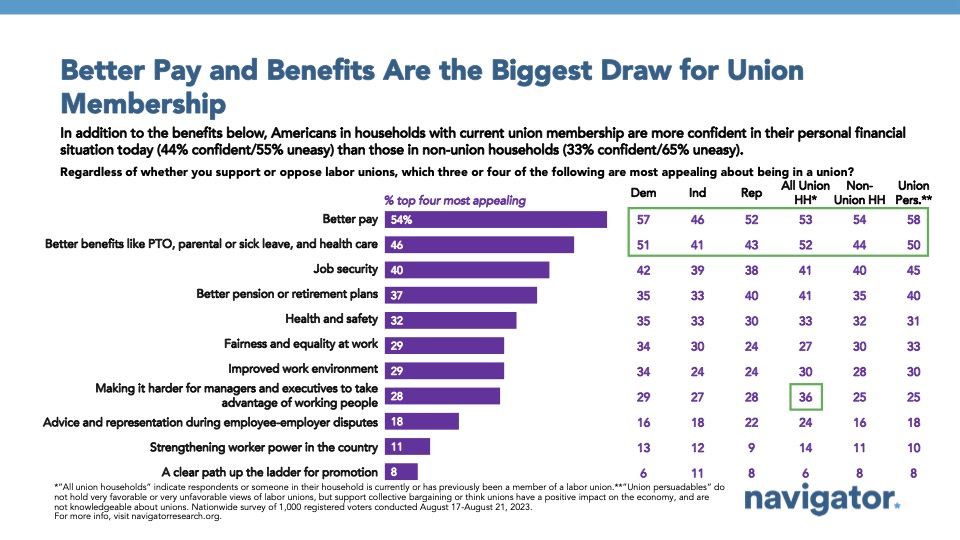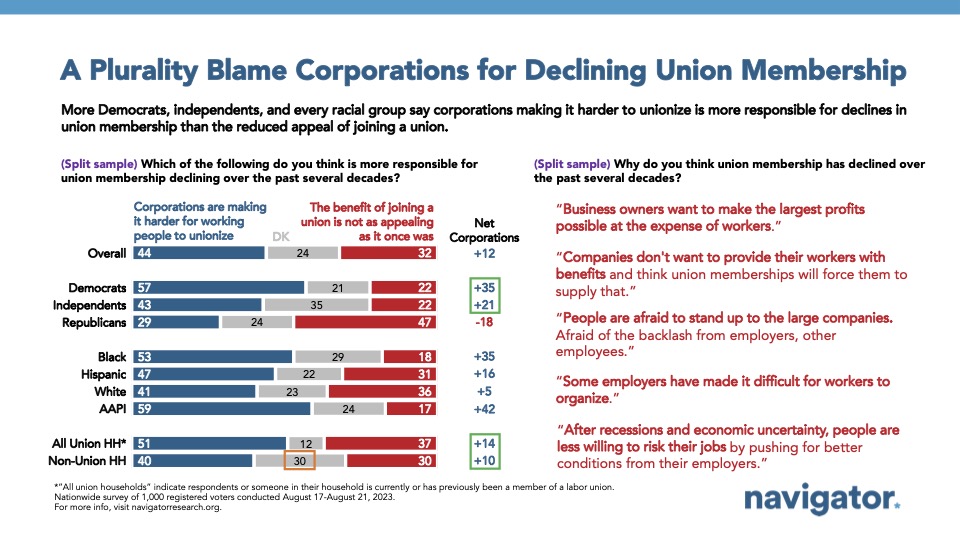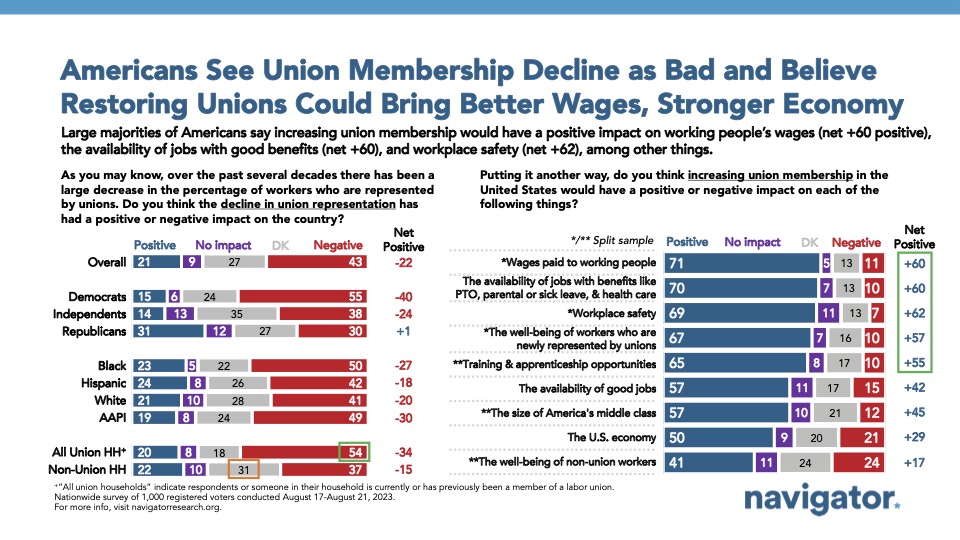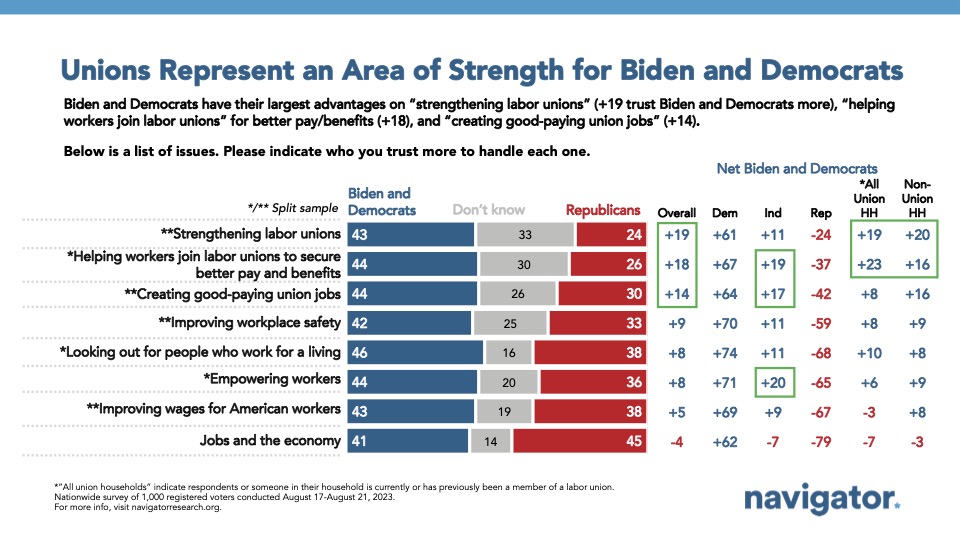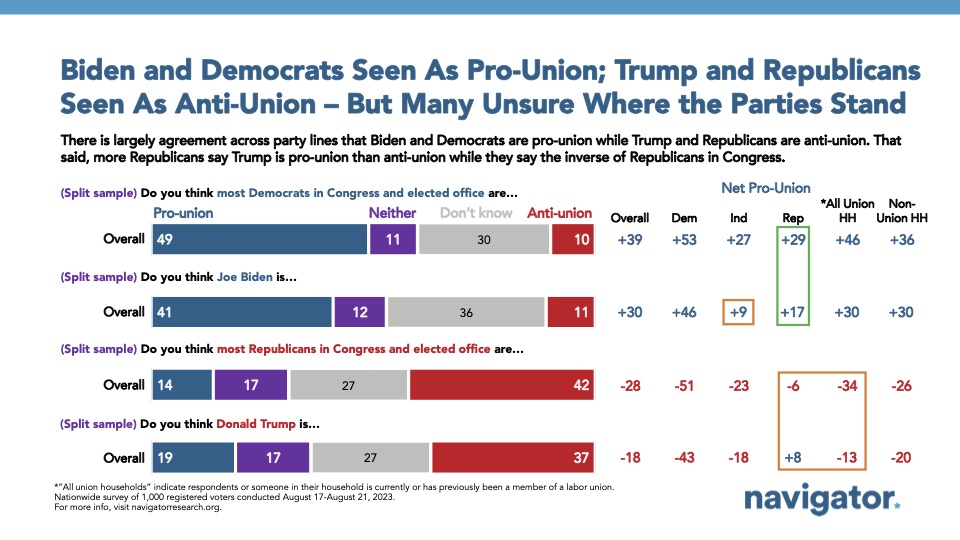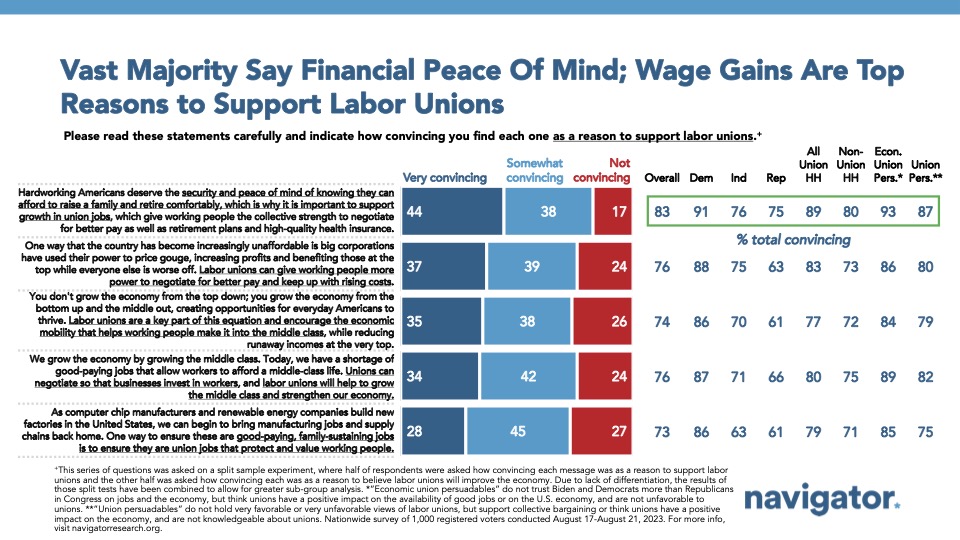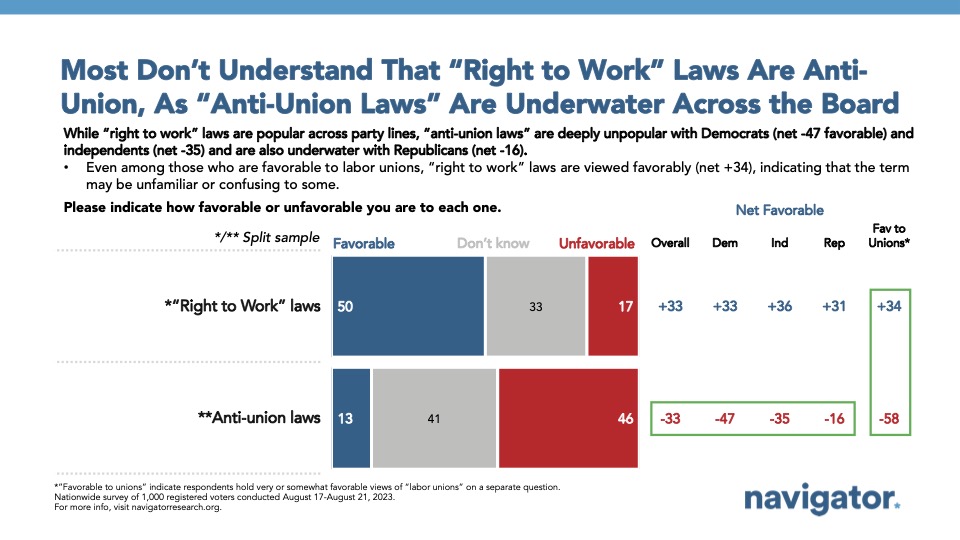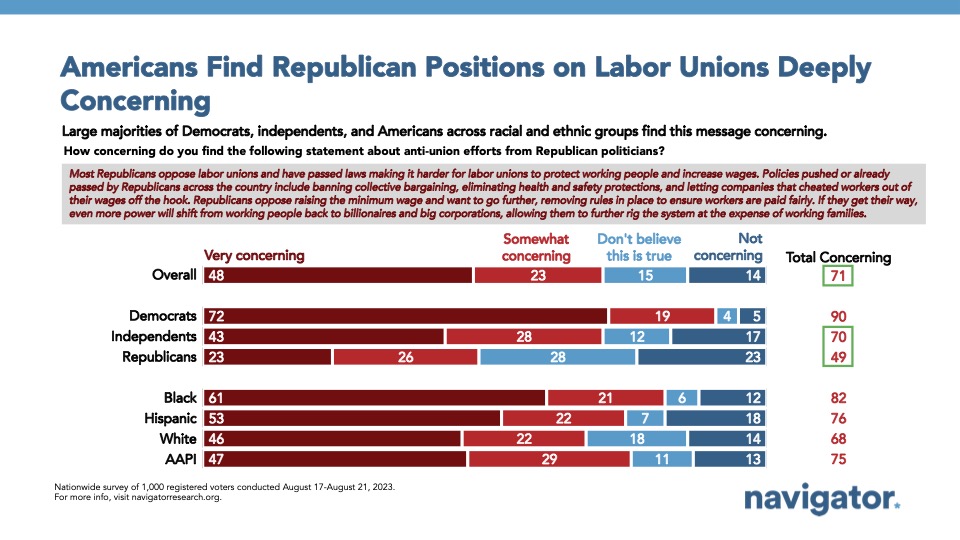Poll: Labor Unions in America
This Navigator Research report contains polling data on Americans’ latest perceptions of labor unions, including what Americans view as the most important benefits of labor unions, perceptions of anti-union policies and declines in union membership, and which party Americans view as the most equipped to strengthen labor unions and empower workers.
Two in three Americans support making it easier for employees to form or join a labor union, with even larger shares who support the “right to bargain collectively” and to increase worker power in the United States.
By a 51-point margin, most Americans support labor laws that would make it easier for employees to form or join a labor union (66 percent support – 15 percent oppose), including four in five Democrats (81 percent), two in three Republicans (67 percent), and even half of Republicans (49 percent). An even larger share of Americans — 79 percent — say they support employees’ right to collectively bargain, and 77 percent also say they support increasing worker power in the United States. When asked to rank the top four most appealing aspects of labor unions, “better pay” was listed across party lines and among both union households and non-union households as the biggest draw for union membership.
- Other aspects seen as most appealing about being in a union include “better benefits like PTO, parental or sick leave, and health care” (46 percent), “job security” (40 percent), and “better pension or retirement plans (37 percent). While “making it harder for managers and executives to take advantage of working people” was ranked lower overall (28 percent), it is in the top four most appealing aspects for those living in union households (36 percent).
A plurality of Americans blame corporations more for declining union membership than believe the benefit of joining a union is not as appealing as it once was.
Less than one in three view a decline in union membership as a product of unions not being as appealing as they once were (32 percent), while a greater share view corporations making it harder for workers to unionize as being to blame (44 percent). Significantly larger shares of Democrats (57 percent blame corporations – 22 percent not as appealing) and independents (43 percent blame corporations – 22 percent not as appealing) are much more likely to blame corporations than a weakened appeal in union membership.
- While different views exist as to why membership is in decline, Americans say they view this decline as bad for workers and the economy: by a 22-point margin, Americans view the decline of union membership as having a negative impact on the country (21 percent positive impact – 43 percent negative impact). Democrats and those living in union households are most likely to say the decline in union membership is having a negative impact on the country (55 percent and 54 percent, respectively).
When asked about the potential effects of increasing union membership, seven in ten say there would be both a positive impact on wages paid to working people (71 percent) and the availability of jobs with benefits like PTO, parental or sick leave, and health care (70 percent), while about two in three say there would be a positive impact on workplace safety (69 percent), the well-being of workers who are newly represented by unions (67 percent), and training and apprenticeship programs (65 percent).
Biden and Democrats are more trusted on union and worker empowerment than Republicans.
By a 19-point margin, Democrats are more trusted than Republicans to strengthen labor unions (43 percent Biden/Democrats – 24 percent Republicans). These margins are consistent across a range of issues related to unions and worker quality of life, including “helping workers join labor unions to secure better pay and benefits” (net +18; 44 percent Biden and Democrats – 26 percent Republicans), “creating good-paying union jobs” (net +14; 44 percent Biden/Democrats – 30 percent Republicans), and “looking out for people who work for a living” (net +8; 46 percent Biden and Democrats – 38 percent Republicans)
- Democrats are generally viewed as being more pro-union, while Republicans are generally viewed more as being anti-union: 42 percent of Americans say they believe Republicans are anti-union compared to just 14 percent who believe they are pro-union, while 49 percent think Democrats are pro-union and just 10 percent believe they are anti-union.
Centering financial peace of mind and the ability to negotiate higher pay to keep up with rising costs are seen as the most convincing pro-union arguments.
Among a variety of arguments that were all viewed as convincing reasons to support labor unions, the top two performers included:
- Hardworking Americans deserve the security and peace of mind knowing they can afford to raise a family and retire comfortably, which is why it’s important to support growth in union jobs, which give working people the collective strength to negotiate for better pay as well as retirement plans and high-quality health insurance (83 percent found this convincing; 89 percent of those living in union households and 76 percent of independents found this argument to be convincing); and,
- One way that the country has become increasingly unaffordable is big corporations have used their power to price gouge, increasing profits and benefiting those at the top while everyone else is worse off. Labor unions can give working people more power to negotiate for better pay and keep up with rising costs (76 percent found this convincing; 83 percent of those living in union households and 75 percent of independents found this argument to be convincing).
While anti-union laws are strongly unfavorable across party lines, most don’t understand that “right to work” laws are anti-union laws.
Just over one in ten say they have favorable views of “anti-union laws” (net -37; 13 percent favorable – 50 percent unfavorable), with net favorability underwater across the board amongst Democrats (net -47), independents (net -35), and Republicans (net -16). Despite anti-union laws being deeply unpopular, “right to work laws” are viewed favorably across party lines (net +33; 50 percent favorable – 17 percent unfavorable). Even among those who are favorable to labor unions, “right to work laws” were viewed favorably (net +34).
Anti-union efforts from Republican politicians are deeply concerning to Americans.
Respondents were shown the following statement about anti-union efforts from Republican politicians: “Most Republicans oppose labor unions and have passed laws making it harder for labor unions to protect working people and increase wages. Policies pushed or already passed by Republicans across the country include banning collective bargaining, eliminating health and safety protections, and letting companies that cheated workers out of their wages off the hook. Republicans oppose raising the minimum wage and want to go further, removing rules in place to ensure workers are paid fairly. If they get their way, even more power will shift from working people back to billionaires and big corporations, allowing them to further rig the system at the expense of working families.” Seven in ten found this statement to be concerning (71 percent), including nine in ten Democrats (90 percent), seven in ten independents (70 percent), and nearly half of Republicans (49 percent).
- In a separate question, the top concerns Americans have regarding anti-union policies being pursued by Republican politicians include “Republicans want to take power from working people and give it back to billionaires and big corporations, allowing them to further rig the system at the expense of working families” (41 percent) and that “Republicans oppose raising the minimum wage and want to go further, removing rules that are in place to ensure workers get paid fair wages they can make a living on” (32 percent).
Read More
About The Study
Nationwide surveys of registered voters; Each wave represents approximately 1,000 interviews taken over the prior three-five days.
recruiting respondents from an opt-in online panel vendor. Respondents were verified against a voter file and special care was taken to ensure the demographic composition of our sample matched that of the national registered voter population across a variety of demographic variables.
